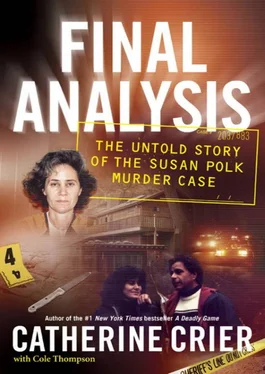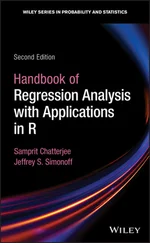“I’ve been doing this for a very long time,” Brady told the witness out of earshot of jurors. “I’ve never had an expert witness respond to either party during an objection. Whether you agree with the objection or not, it is for me to deal with.”
“I’m sorry,” Cooper replied.
But Susan could not let the matter rest. Once again, she charged that Brady and Sequeira were conspiring, this time to “intimidate” her witness.
“I’m outta here,” the prosecutor announced, throwing his arms in the air.
“He’s playing chicken,” Susan accused.
“She’s right!” her mother, Helen Bolling, shouted from the gallery, an outburst that prompted a court bailiff to expel the elder woman from the courtroom. Once in the hallway, Bolling told reporters that she viewed her daughter’s murder trial as “unfair,” labeling it a “phony trial.”
That afternoon, Dr. Cooper continued his testimony, listing seven reasons why he believed that Dr. Peterson’s autopsy was not “objective.” There was the “physical improbability factor” with Felix standing five inches taller and fifty pounds heavier than his wife and “direct evidence” such as the injury on Susan’s face and strands of her hair in Felix’s death grip. According to Dr. Cooper, the “defensive wounds” on Felix’s body supported the theory that he was attacking Susan with his right hand while blocking the knife with his left. He noted that the wounds had a leftward slant and clumps of Susan’s hair were found in his right hand. Cooper insisted that the data indicated that Felix “didn’t turn and run.” The fact that Felix ripped out strands of his wife’s hair, punched her in the face, and bit her on the hand was proof that he was the party responsible for the assault, the expert argued. “To me, he did not try to avoid violence, he was trying to perpetuate it,” he said.
In addition, there was also the “distribution” and “multiplicity” of the stab wounds coupled with “the relative position of the two combatants.” Blood from Felix’s chest and upper thighs had flowed to his knees, but not his shins, supporting his claim that Susan was under Felix during the attack. Furthermore, Cooper pointed out that the county’s medical examiner would have found evidence of blood flowing down the back of Felix’s head and neck if he had been struck first on the head by Susan that night. He called the State’s theory that she had initiated the attack with an incapacitating blow to the head “a bogus suggestion,” noting that Felix’s head wound lacked bruising.
The pathologist agreed with Susan’s assertion that Felix’s body was moved after his death, evidenced by blood smudges found on the floor near the corpse. This comment drew objections from the prosecutor, who took issue with the scope of Dr. Cooper’s testimony. Sequeira argued that while Cooper was qualified to render medical findings, he was not an expert in criminal investigations and should not be espousing theories as to how the crime played out. Judge Brady agreed with Sequeira and sustained the objection.
In the minutes before court ended that Thursday, Dr. Cooper made a stunning admission: He did not write a report of his findings, nor did he have any notes to turn over to the prosecutor. Essentially, he had come to court without any of the supporting materials he had used to render his expert opinion in the first-degree murder case.
“Once one knows the truth of the case, one does not need to remain neutral,” he told Sequeira. “One goes with the truth.”
Sequeira’s frustrations, which he had previously directed only at Susan, came out, as his patience with Dr. Cooper disappeared. The prosecutor retorted, “You don’t think it’s not good professional practice to write a report so people can review what your findings are in a murder case?”
Dr. Cooper challenged Sequeira to “subpoena” him, claiming he had not prepared a written report for fear that it would be used as a tool to prevent him from testifying. He also noted he had not been asked by the prosecutor to prepare one.
“I don’t consider it appropriate for you to know all of the details of what I’m going to testify to,” Cooper added.
The discussion was clearly becoming a problem. Sensing a number of issues with Dr. Cooper’s testimony, Judge Brady intervened, halting the cross-examination and clearing the jury and the witness from the courtroom. She informed Susan that protocol required expert witnesses to provide the other side with supporting documents used to render a decision in a case. Susan told Brady that she hadn’t made copies of her written correspondence and claimed there were no notes. When Brady appeared skeptical, Susan launched into a frenzied attack, repeatedly cutting the judge off mid-sentence and accused her of being “wrong.” Ultimately, Judge Brady sided with Sequeira on the matter and ordered Dr. Cooper to produce his report based on the evidence the next morning.
The following morning, Dr. Cooper failed to produce the discoverable materials he had used to prepare his testimony. Brady demanded an explanation. Initially Dr. Cooper claimed to have left them on the plane—after telling members of the court that he had driven up from Texas to testify on Susan’s behalf. He then suggested that a burglary may have occurred in his motel room. From the witness stand, he said that at one point during his stay, he returned to find the door to his room stuck shut, leading him to suspect a thief. Perhaps the documents were among the items taken, he put forward.
Judge Brady was incredulous. “I must admit I am very troubled by the turn of events this morning. Don’t you have copies in your office?”
Dr. Cooper’s answer was vague, and after some back and forth, he suggested the materials could be at his home in Austin.
“Are you married?” the judge inquired.
“Yes.”
“Then have your wife FedEx them to court,” Brady suggested.
“Um. My wife is out of town,” the expert replied.
“Do you have pets?”
“Yes, dogs.”
“Who is feeding the dogs?” the judge asked.
“Um…I don’t know.”
“I don’t believe you and order you to have the letters faxed to the court by Monday.”
It was then that Paul Sequeira lost his temper. The prosecutor, who for weeks had tried to keep his composure, rose to his feet and launched a formal complaint, saying that through all of Susan’s continued attacks and outbursts, he had done his best to remain in control. “But this latest shenanigan is unacceptable,” he remarked. “How is this happening? This is outrageous! The witness is going back and forth on the existence of these letters. Not only that, but he’s testifying way outside the area of his expertise. He’s creating verbal crime scene reenactments for the jury.”
While Sequeira was criticizing Susan and her witness, Susan attacked Brady’s ruling regarding the papers. In Susan’s opinion, she should not have to provide the prosecutor with the disputed papers if he did not explicitly ask for them beforehand. In addition, she also disputed the judge’s assertion that the laws of reciprocal discovery covered the materials, arguing, incorrectly, that discovery “is a relatively new concept and still being developed.” Susan claimed that Dr. Cooper’s testimony “was completely independent, unbiased, and neutral, and she attacked the prosecutor, calling him a ‘cry baby.’
“He doesn’t like Dr. Cooper’s testimony, so he does a little dance in front of the media and says I’m in violation of discovery,” Susan quarreled.
“I want you to listen to me, Mrs. Polk,” Judge Brady intervened. “If you make any more insults, I will sanction you.”
Despite the threat, it was not immediately clear what the judge had in mind. The situation embodied the paradox that the judge faced throughout the trial: Susan was already in custody, so what other punishment could Brady hand down? It was a difficult situation for Brady, but it was becoming increasingly clear that Susan needed to be reigned in. Susan’s respect for the court had been far from exemplary, but now her witnesses were giving testimony that seemed dangerously close to perjury, conduct that could produce serious consequences for Susan.
Читать дальше











